Dealing with a narcissist can be an overwhelming and challenging experience. Whether in personal relationships or professional settings, understanding how to navigate interactions with narcissists is crucial for maintaining your well-being.
Narcissistic individuals often exhibit self-centered behaviors, a grandiose sense of self-importance, and a lack of empathy, making interactions particularly draining.
Recognizing these narcissistic traits (red flags) and implementing effective strategies can help you maintain healthy relationships and protect your mental health.
This article explores expert advice on how to deal with a narcissist, focusing on setting healthy boundaries, practicing self-care, and seeking support from mental health professionals.
Managing the complexities of relationships with individuals displaying narcissistic behaviors is not easy, but these insights should give you a good place to start.
How to Deal with a Narcissist: Understanding Narcissistic Characteristics
Before diving into strategies, it’s important to understand what narcissism entails. Narcissistic Personality Disorder (NPD) is characterized by a pervasive pattern of grandiosity, a constant need for admiration, and a lack of empathy.
Individuals with NPD often display arrogance, entitlement, and a tendency to exploit others for their own benefit. These narcissistic traits can create significant challenges in relationships, making it essential to develop effective coping strategies.
NPD is more than just an inflated sense of self-importance; it’s a complex mental health condition that affects how individuals perceive themselves and interact with others.
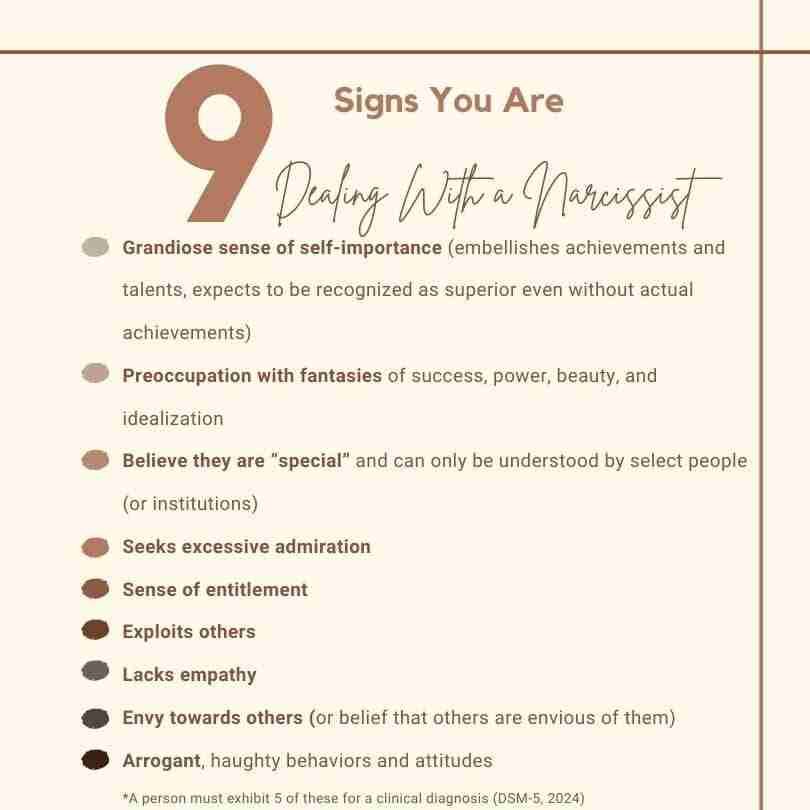
The Diagnostic and Statistical Manual of Mental Disorders (DSM-5) outlines specific criteria for diagnosing NPD, including a grandiose sense of self-importance, a preoccupation with fantasies of unlimited success, and a belief that they are special and unique.
Individuals with NPD may react poorly to the slightest criticism, often perceiving it as a personal attack. Their fragile egos can lead to defensive behaviors, passive aggression, and even direct confrontation.
These narcissistic behaviors can be particularly damaging in personal and professional relationships, as the narcissist’s need for constant praise and admiration often takes precedence over the needs and feelings of others.
Understanding these narcissistic characteristics is crucial for identifying narcissistic tendencies and implementing effective coping mechanisms.
Recognizing the signs of narcissistic abuse, such as gaslighting and manipulation, can help you protect your mental health and maintain healthy boundaries.
Understand the Fear Behind Narcissistic Personality Disorder
Narcissistic Personality Disorder (NPD) is often misunderstood, leading to frequent mislabeling and misdiagnosis. It’s crucial to distinguish between someone who occasionally exhibits narcissistic traits and someone who meets the clinical criteria for NPD.
True NPD involves a pervasive pattern of grandiosity, a constant need for admiration, and a profound lack of empathy, which can have deep psychological roots.
Individuals with NPD exhibit self-centered, arrogant thinking and behavior, lacking consideration or empathy for others.
One key aspect of NPD is the intense fear of vulnerability. Individuals with NPD often harbor an overwhelming fear of appearing weak or incompetent.
This fear can stem from early childhood experiences, where they might have faced severe criticism, neglect, or emotional abuse, leading them to develop narcissistic defenses to protect their fragile self-esteem.
Understanding this underlying fear is essential for developing empathy towards individuals with NPD.
It’s important to recognize that not every difficult or hurtful behavior indicates narcissism.
Misunderstanding and overusing the term can diminish the experiences of those truly affected by NPD.
Approaching these situations with a nuanced perspective allows for more compassionate and effective strategies.
Kathryn Gates, a marriage and family therapist and owner of Gates Therapy, emphasizes the importance of this understanding in her professional experience.
Kathryn Gates, Marriage & Family Therapist, Mental Health Professional, Gates Therapy

My first reaction to this question is that just because your male partner does something you don’t like does not mean he meets the criteria for Narcissistic Personality Disorder.
I’m just tired of hearing from every woman who has been in an argument that her partner was ‘gaslighting’ her. Or that every woman who has been hurt by a man makes that man a narcissist.
That said, I have experience working with both the disorder and family members of those with the disorder.
An important thing to remember is that the person who has an NPD diagnosis is struggling with the overwhelming fear of feeling or exhibiting weakness.
If you understand how hard he or she is working to avoid feeling or seeming weak, you can find compassion for and understanding of the person struggling with this disorder.
As much as wives and girlfriends want to believe that these are just assholes who want to hurt people, a person with an NPD diagnosis is hurting immensely and likely has painful trauma in their history, or they wouldn’t behave so hurtfully.
Trust Your Intuition and Prioritize Health
Dealing with a narcissist can be emotionally exhausting and confusing. Trusting your intuition and prioritizing your well-being when navigating these relationships is essential.
Emotional abuse from a narcissist often involves subtle and manipulative tactics that can leave you doubting your own perceptions and feelings.
This abusive behavior can be difficult to identify, but understanding these dynamics can help you recognize the signs and act appropriately.
Narcissistic abuse typically includes behaviors like gaslighting, where the abuser makes you question your reality, and love-bombing, where they shower you with excessive attention and affection to manipulate you.
These tactics can make it difficult to see the true nature of the relationship, leading you to make excuses for the narcissist’s behavior. It’s crucial to listen to your gut feelings and acknowledge the red flags.
Nina Batista, a licensed clinical social worker and owner of Nina Batista Counseling, highlights the importance of recognizing emotional abuse and taking steps to protect your health.
Nina Batista, LCSW, Nina Batista Counseling
My name is Nina Batista. I’m a licensed clinical social worker certified in treating survivors of narcissistic abuse. My journey began with my personal experience of being with a covert narcissist for four years and ultimately being discarded (yup, he went on a business trip and literally never came back.)
He deleted me from all social media and just left me alone in our apartment with our dog and all of his belongings.
If you’ve been researching emotional abuse and you feel like all the blog posts are about your relationship, then there’s a 100% chance you are being abused.
Do not gaslight yourself; trust your intuition—there is a reason you researched that to begin with.
My biggest tip would be to stop making excuses for their bad behavior.
‘Sorry’ means nothing if their unacceptable behaviors stay the same—that’s not an apology; that’s manipulation.
The sooner you accept them for who they ACTUALLY are and stop holding onto their potential, the easier it will be for you to accept that they will never change. You need to get out and prioritize your health.
Remember—it is not your fault; you cannot love them hard enough to change.
Don’t stay just because you are lonely; don’t drink poison just because you’re thirsty.
Tell someone you trust and love about the relationship—burst the denial bubble and tell someone who can help remind you that you deserve better and that this person will not change.

Reconciling Different Expert Opinions About Dealing With a Narcissist
The expert advice presented in this article comes from different perspectives, highlighting the complexity of dealing with a narcissistic person.
Kathryn Gates emphasizes understanding the fear and trauma underlying Narcissistic Personality Disorder (NPD), suggesting that compassion can be part of managing these relationships.
She points out that individuals with NPD often struggle with an overwhelming fear of vulnerability and weakness, which can stem from painful experiences.
She also underscores the importance of understanding that Narcissistic Personality Disorder requires a clinical diagnosis and should not just be applied to every family member, romantic partner, or even boss we don’t get along with.
Conversely, Nina Batista focuses on trusting your intuition and prioritizing your health. Her advice stems from personal experience and highlights the manipulative and abusive behaviors often exhibited by narcissists.
Batista underscores the necessity of recognizing emotional abuse and taking steps to protect oneself, emphasizing that excuses should not be made for harmful behavior.
These differing tones reflect the multifaceted nature of NPD. While understanding the disorder’s roots can foster empathy, it is equally crucial to protect your own well-being. Balancing compassion with self-preservation is key.
Recognize that while narcissists may act out of deep-seated fears, their behaviors can be harmful. A licensed mental health counselor will help you determine what narcissistic behavior is.
Personality disorders like NPD should be met with professional help.
By combining these insights, readers can approach their interactions with narcissists (and everyone else) with both understanding and the resolve to maintain healthy boundaries and seek professional support when necessary.

Insights and Strategies for Dealing With a Narcissist
To effectively navigate these challenging interactions, it’s essential to develop practical strategies and insights.
The following sections will delve into expert advice and personal experiences, offering a range of techniques for setting healthy boundaries, protecting your mental health, and seeking support.
By understanding these strategies, you can better manage the complexities of dealing with a narcissist and maintain your well-being.
Recognize the Red Flags of Narcissistic Behavior Early
One of the most critical steps in dealing with a narcissist is recognizing the red flags early. Narcissists often exhibit charm and charisma initially, which can mask their true intentions.
Pay attention to patterns of manipulation, such as excessive flattery, love-bombing, and a lack of accountability for their actions.
These behaviors are often indicators of narcissistic tendencies and can be early warning signs of more serious narcissistic personality traits.
Excessive flattery and love-bombing can make you feel special and valued, but these tactics are often used to establish control and dependency.
Once the initial charm fades, narcissists may reveal a pattern of self-centeredness and exploitative behavior.
A lack of accountability is another significant red flag. Narcissistic individuals frequently refuse to acknowledge their own faults, instead blaming others for any problems or conflicts.
Another red flag is hypersensitivity to criticism. Narcissists often react strongly to negative feedback, perceiving it as a personal attack.
This can manifest in passive-aggressive behavior or outright hostility. Recognizing these signs early can help you set strong boundaries and protect your well-being.
It’s essential to remain calm and not take their behaviors personally, as their actions are typically driven by their own insecurities and need for validation.
By identifying these narcissistic behaviors early on, you can take steps to safeguard your mental health and seek support from trusted friends, family members, or a licensed mental health professional.
Recognizing the red flags can prevent deeper involvement with a narcissist and help you maintain healthier relationships.
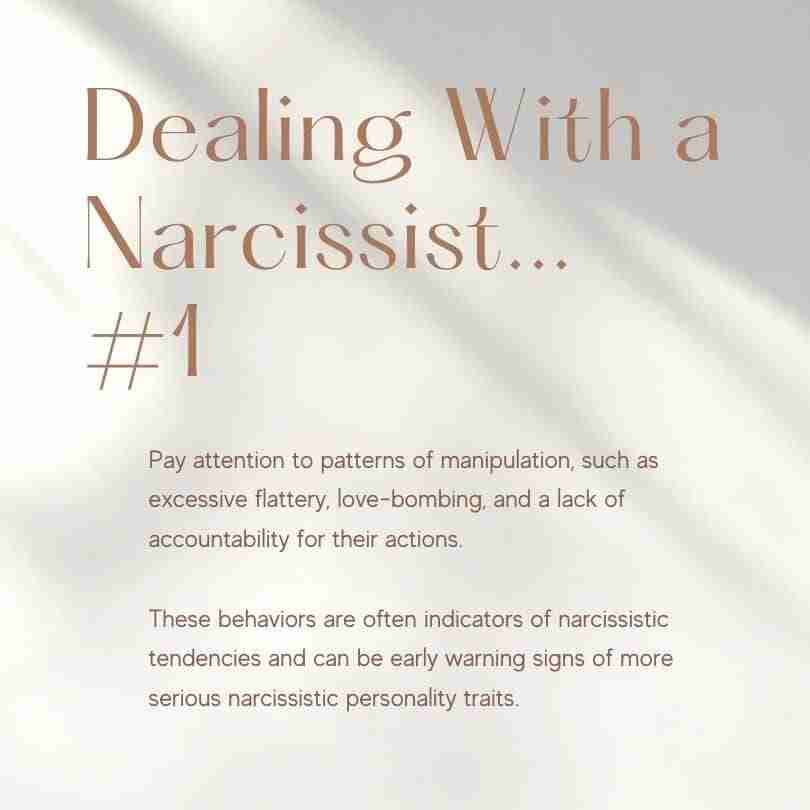
Establish and Maintain Healthy Boundaries
Setting firm boundaries is essential when dealing with a narcissist.
Clearly define what behaviors you will not tolerate and communicate these limits assertively. For example, you might need to limit the time you spend with the narcissist or explicitly state the consequences of their actions if they overstep your boundaries.
Consistency is key; narcissists often test limits to see if they can push past them. Stand firm and reinforce your boundaries as needed.
Prioritize your well-being above all else. It’s crucial to recognize that maintaining these boundaries is not selfish; it’s a necessary step to protect your mental health.
Healthy relationships are built on mutual respect and understanding, and by establishing clear limits, you are fostering an environment that supports your emotional and psychological safety.
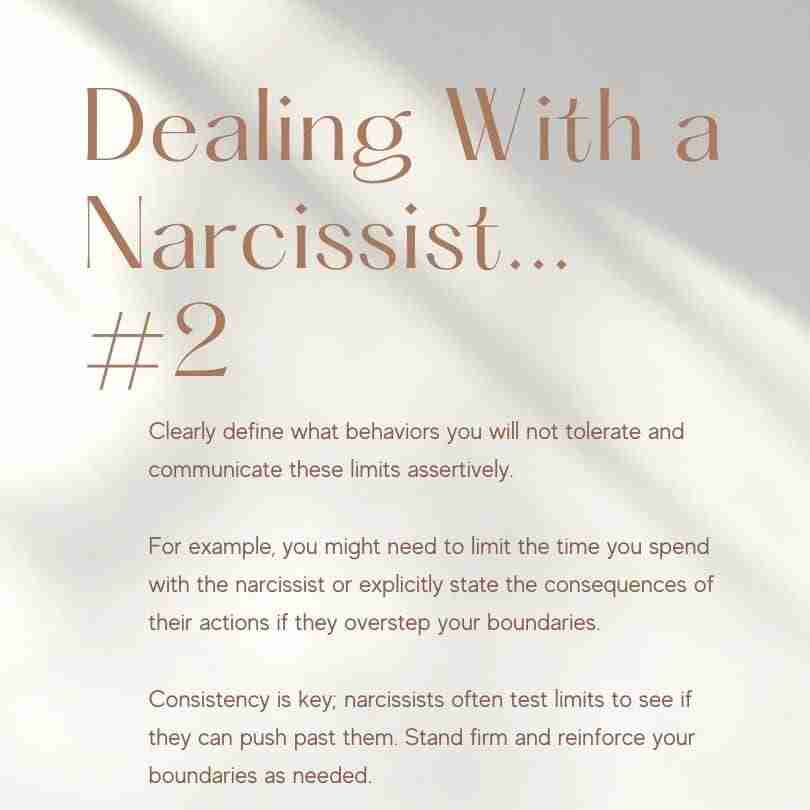
Seek Support and Practice Self-Care
Dealing with a narcissist can be emotionally draining, so it’s vital to prioritize self-care. Engage in activities that rejuvenate you, such as exercise, hobbies (like adult coloring), or meditation, to maintain your mental health.
Seek support from friends, family, or a licensed mental health professional who can offer guidance and understanding.
Sharing your experiences with trusted individuals can provide a sense of relief and validation, helping you feel less isolated in your struggles.
Support groups for those dealing with narcissistic abuse can also be beneficial, offering a community of people who understand your experiences.
Remember, prioritizing your well-being is crucial when navigating the challenges posed by a narcissist. Taking time for self-care and seeking emotional support ensures you remain resilient and maintain a healthy perspective.
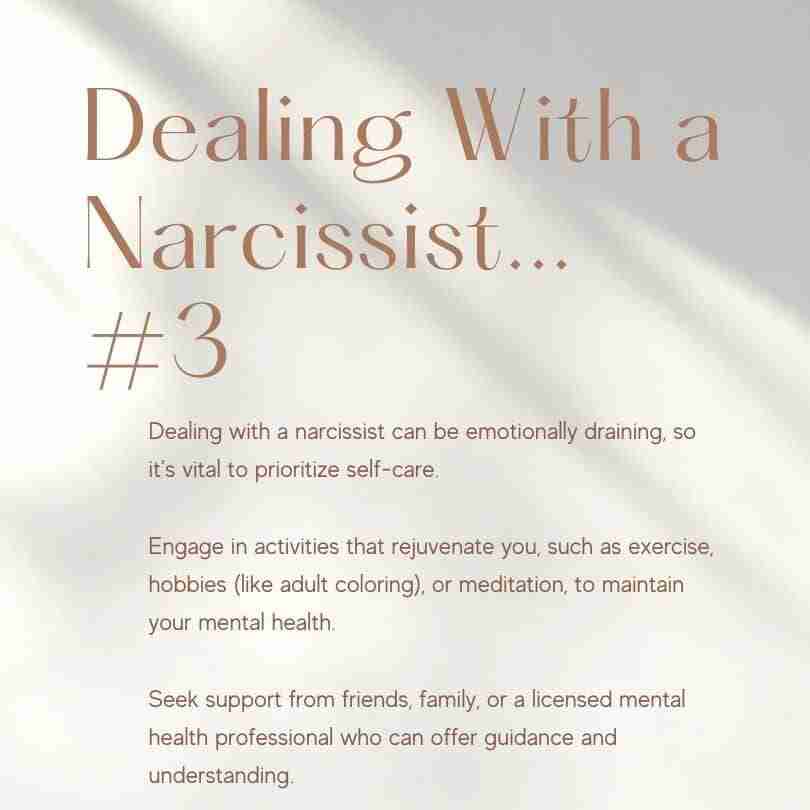
Educate Yourself
Understanding narcissistic behavior can empower you to navigate interactions more effectively.
By educating yourself about narcissistic personality disorder and related behaviors, you can better recognize and respond to manipulation and abuse.
Read books, attend workshops, and seek professional advice from licensed mental health professionals to build your knowledge and resilience.
Gaining a deeper understanding of narcissistic traits and tendencies helps you anticipate potential issues and develop strategies to protect yourself.
Knowledge is a powerful tool in managing relationships with narcissists, helping you maintain control and prioritize your well-being.
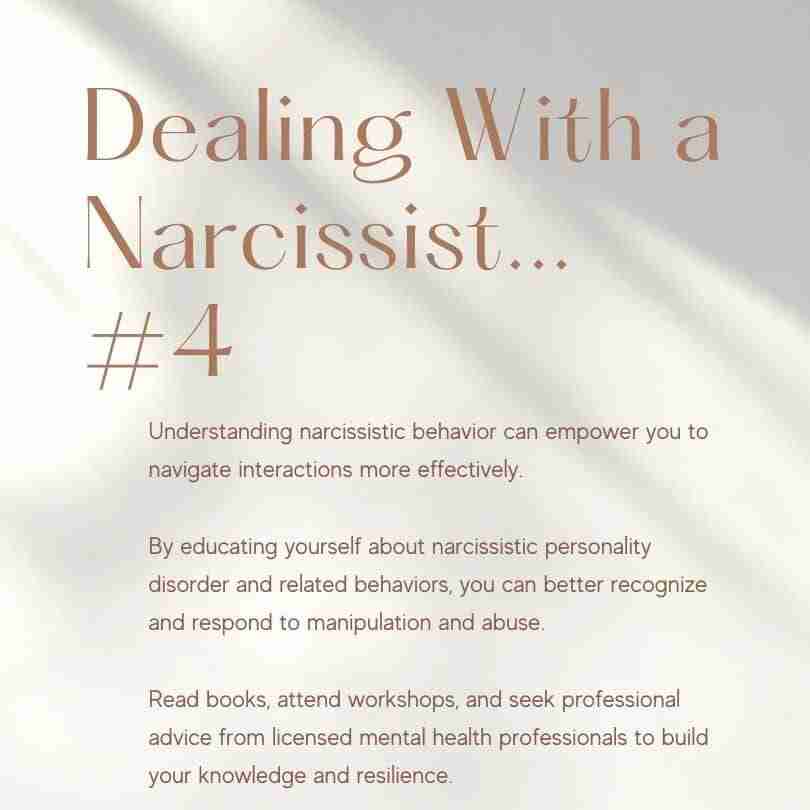
Embracing Empowerment and Resilience When Dealing With a Narcissist
Dealing with a narcissist requires a blend of awareness, self-care, and strategic action.
Recognizing the red flags early and understanding the underlying fears driving narcissistic behavior are crucial steps in protecting your mental health and fostering healthier relationships.
By setting firm boundaries and prioritizing your well-being, you can navigate interactions with a narcissist more effectively and maintain your emotional resilience.
Seeking support from friends, family, or mental health professionals can provide the guidance and validation needed to cope with the challenges posed by narcissistic individuals.
Additionally, engaging in self-care practices and educating yourself about narcissistic personality disorder can empower you to handle these interactions with greater confidence and clarity.
Balancing empathy for the struggles faced by individuals with NPD with the necessity of self-preservation is key.
By combining expert advice and personal insights, you can approach these relationships with both understanding and the determination to protect your well-being.
Remember, it’s essential to trust your intuition, seek professional help when needed, and stay committed to your own health and happiness.
Share your thoughts with us in the comment section below.





























Great article!
Thank you for this objective perspective. Your article is filled with both validation and hope.
Thank you for writing this!
Despite people throwing around terms like narcissist more easily these days, I think most people have dealt with people who have narcissistic behaviors and/or NPD. I’ve dealt with several, including the upper elementary teacher who sexually and otherwise abused me and an abusive ex.
Something that a lot of the discourse around this fails to mention is the point at which narcissistic behaviors move from developmentally appropriate to concerning. I wonder sometimes what signs adults may have seen but dismissed in my abusers. I also wonder if early intervention (e.g. therapy) might have made life easier to navigate for them, though of course the best interventions would have been removing them from the trauma that created or exacerbated NPD.
I’m also curious about the seeming rise in narcissistic behaviors. Are they actually increasing or are more people aware of them? If they are increasing, what can be done to change that?
Thanks for leaving such a detailed comment. We are sorry you experienced such terrible trauma at a young age.
Those are some great questions and I will start looking into the answer for another article.